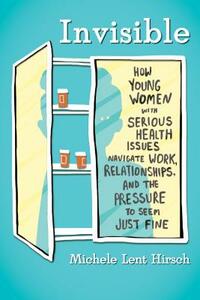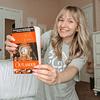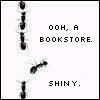Take a photo of a barcode or cover
I am very conflicted about this book, but none of that confliction has to do with the quality of the work. Both the research and the care put into the book are fantastic, I was highlighting quotes constantly because I didn't want to forgot how eloquently she put ideas I've had tumble around my head for ages.
However, as the author mentioned in her author's note, this book cannot cover ever illness/disability/etc. I have four different chronic illnesses, none of which are life threatening, they are just ever present and fucking suck. I had a hard time relating to the themes of mortality and death. Which, I think, was kind of the point. My lack of experience with it doesn't make it invalid, and reading about mortality in one's twenties expanded how I thought about illness. But there was no flip side to the conversation, at least not one I picked up on. I am not confronted with my mortality, I am confronted with the notion that I had these forces controlling my life for years (even before I had a name for them), and the forces will be controlling my life for the years to come. The author cannot cover everything, like she said and like I would expect, but the feeling of being left out in a situation where I thought my experiences would be acknowledged still stings a bit.
Yet that feeling is not what caused my conflicted feelings. Those occurred after reading the constant barrage of shitty things these women have had to put up with. Not all of these things happened to one person, but reading the worst things that had happened to all of these women right in a row made me feel like shit. Maybe it's just a deep seeded fear of "this could be my future, these scenarios could happen to me at any moment." And even though I have HAD situations like this happen before, I worried all of these scenarios would happen to me at once. So that fear was one part, the other was just the constant rehashing of the worst experiences people have had regarding their illness. It is not the authors responsibility to make me feel hopeful. She has stories to tell, stories that are often ignored and deserve the platform she gave them. That still doesn't change the fact that reading this book made me feel deeply sad. Thus, the conflict. The book had wonderful research, including intersectionality of queer identity (which is my favorite), as well as beautifully written prose, yet, I felt serious dread when I thought about picking it back up to finish a chapter.
This book was written for someone, and for those people I am sure this is a phenomenal read, but I am just not one of those someones.
However, as the author mentioned in her author's note, this book cannot cover ever illness/disability/etc. I have four different chronic illnesses, none of which are life threatening, they are just ever present and fucking suck. I had a hard time relating to the themes of mortality and death. Which, I think, was kind of the point. My lack of experience with it doesn't make it invalid, and reading about mortality in one's twenties expanded how I thought about illness. But there was no flip side to the conversation, at least not one I picked up on. I am not confronted with my mortality, I am confronted with the notion that I had these forces controlling my life for years (even before I had a name for them), and the forces will be controlling my life for the years to come. The author cannot cover everything, like she said and like I would expect, but the feeling of being left out in a situation where I thought my experiences would be acknowledged still stings a bit.
Yet that feeling is not what caused my conflicted feelings. Those occurred after reading the constant barrage of shitty things these women have had to put up with.
Spoiler
What that awful man said to the author in the elevator, the bus driver not accommodating her, the woman on the bus yelling at her to stand up, women being told they were too broken to be loved, they couldn't marry anyone if they were sick, doctors completely dismissing symptoms, etc.This book was written for someone, and for those people I am sure this is a phenomenal read, but I am just not one of those someones.
W O W I love this book. This is one of the best books I have read about health and gender EVER. Hirsch shares about her own experiences surviving a series of catastrophic health events in her early twenties while intertwining the experiences of other female-identifying or minority individuals. I was most impressed with her intersectional approach; she includes WOC, incarcerated, queer, nonbinary, and trans individuals in her interviews and research. She herself is bisexual, and she uses her identity and health issues as a way to draw attention to our broken medical system. And it is broken in so many ways. Doctors not believing their patients, prolonging cancer diagnoses, discriminating against queer folx and POC, and even sexually assaulting their patients are all discussed at length. I originally picked up this book, hoping that it would discuss endometriosis (which it does briefly and accurately) but found myself connecting with this book on a whole other level. To be young, female, and sick in this society is no easy task, and it was nice to finally read something that accurately captures that experience.
Everyone go read this right now. Whether you struggle with chronic pain or not. It made me feel so seen. I want everyone to read this because the world treats young women with chronic illness, pain, and disability in a particular kind of terrible way. The author interviews cis and trans women, as well as women of various races, classes, sexualities and conditions, as well as drawing on her own experience. She provides quantitative evidence of what we all have known for forever: job discrimination, medical malpractice, and the destruction of relationships that often occur due to ableism in this country. Please go read this.
informative
reflective
sad
medium-paced
Very easily digestible, and it's always validating to see others who've experienced things you have. I didn't totally relate to the text because of reasons I don't feel like disclosing to internet strangers, hence only 3 stars, but also I don't see that impacting most people's ability to enjoy this.
I was hoping to feel encouraged and supported by this book, but I think it might not have been written for me. It’s as if it was trying to do too many things at once- be a memoir and journalism, educate outsiders and commiserate with insiders- and it ended up reading more as a litany of reasons that it sucks to be sick or disabled. This tone made it hard to pick up and it took me nearly three months to read it. It definitely wasn’t what I needed, but I could see it being of informative value to some.
Most interesting, most heart rending, best acknowledgement section I've read in a while. Pair this with those other books about how medical ppl don't take women or minorities's pain and experience seriously.
I learnt a LOT from this book about how young women are affected by serious/chronic illnesses and navigate not just physical constraints, but social ones - in various aspects of their lives. Really well-thought out, researched, and nuanced book. Hirsch made an effort to interview young women and non-binary people from different walks of life, and it's clear that people who are, say, trans or POC generally have an even harder time than a cis white woman would. I also appreciated Hirsch's effort to ground her book in a feminist framework, which made the issues under discussion and her analysis richer and smarter. For example, Hirsch discusses the bias in science toward viewing male human subjects as 'neutral' while also assuming that women's bodies can't differ that much, and how that leads to big problems in diagnosing women with substance abuse issues. Other points in the book that really stood out for me: (1) the way men treat (and generally walk away) from women they're dating who get diagnosed with serious health issues; (2) abuse in the medical setting, especially of black women who face much higher rates of physical/sexual assault in addition to not being given the pain medication they require (I'd known about that, but I hadn't known this was due to the tendency to view black women as requiring pain medication to feed substance abuse habits. Seriously!!! this made my blood boil).
The book was hard reading, if only because the content was so heavy and... well... sad that I couldn't read it in a single setting. Otherwise, I wouldn't say this was a difficult TO read. Hirsch writes clearly and informatively, and the personal stories of the people she speaks to illuminate the points she's trying to make. I only have two criticisms to make: first, Hirsch could have delved more into the literature there is on disability and feminism. Second, there are some odd uses of collective nouns ('a fistful of issues', 'shreds of autonomy') that felt rather stilted. Aside from that, I'd still say this was definitely worth a read.
The book was hard reading, if only because the content was so heavy and... well... sad that I couldn't read it in a single setting. Otherwise, I wouldn't say this was a difficult TO read. Hirsch writes clearly and informatively, and the personal stories of the people she speaks to illuminate the points she's trying to make. I only have two criticisms to make: first, Hirsch could have delved more into the literature there is on disability and feminism. Second, there are some odd uses of collective nouns ('a fistful of issues', 'shreds of autonomy') that felt rather stilted. Aside from that, I'd still say this was definitely worth a read.
informative
sad
slow-paced
“Everyone Has To Be
Nice To You If You’re Sick…Un-
Less You’ve Caught The Brand
Of Sick That Takes Too Long To Get
Well Soon.” - poem by Daniela Olszewska, page 197
This was a hard read but just what I needed to feel less alone right now.
Nice To You If You’re Sick…Un-
Less You’ve Caught The Brand
Of Sick That Takes Too Long To Get
Well Soon.” - poem by Daniela Olszewska, page 197
This was a hard read but just what I needed to feel less alone right now.







